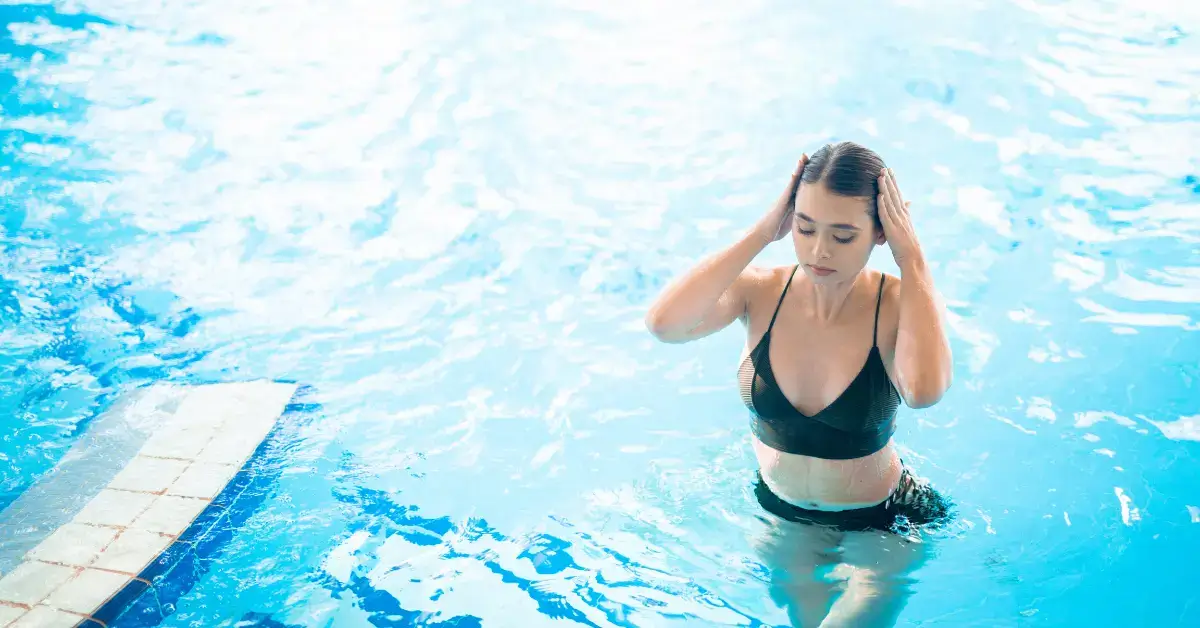Chlorine, while essential for maintaining pool cleanliness, can unfortunately harm hair health. Many have experienced their hair feeling dry and straw-like after swimming. This is because chlorine removes natural oils from the hair, leading to it becoming dry, brittle, and occasionally developing a green tint. However, there are smart strategies you can employ to protect your hair from the damaging effects of chlorinated pool water and ensure it remains healthy.
Understanding Chlorine and Hair Health
When you plunge into a pool, chlorine is a mixed blessing. It’s essential for keeping the water clean, but it can be tough on your hair. Let’s explore how chlorine affects different hair types and what you can do to protect your locks.
The Effects of Chlorine on Different Hair Types
Chlorine has a knack for stripping hair of its natural oils, leading to dryness, split ends, and sometimes even a change in hair color. Fine hair may become more brittle, curly hair might lose its definition, and color-treated hair could fade quicker. Hair health is on the line when exposed to chlorine, and the extent of damage can vary depending on your hair type.
- Fine Hair: Increased susceptibility to breakage.
- Curly Hair: Prone to frizziness and tangles.
- Color-Treated Hair: Potential for premature color fading.
Managing Chlorine Exposure for Healthy Hair

Minimizing your hair’s exposure to chlorine is key to maintaining its health. You can wet your hair with clean water before diving in, which helps reduce the amount of chlorine absorbed. Post-swim, it’s crucial to rinse hair immediately and wash with a gentle shampoo to remove chlorine buildup.
Pre-Swim:
- Wet hair thoroughly with non-chlorinated water.
Post-Swim:
- Rinse with clean water for 5 minutes.
- Use a gentle, sulfate-free shampoo ($17.99).
Chlorine Damage and Its Prevention
To combat chlorine damage, you should integrate deep conditioning treatments into your hair care regimen and consider wearing a protective swim cap ($13.09). Preventive measures can preserve the integrity of your hair and ward off the drying effects of chlorine.
- Deep Conditioning: Apply a nourishing conditioner ($6.97) once a week.
- Swim Caps: Silicone caps are best to shield hair from pool water.
Deep Conditioning and Repair

For your hair’s long-term health, deep conditioning is a savior. It helps repair damage and infuse your hair with much-needed moisture. Opt for a deep conditioning treatment at least once a week, or more if you’re a frequent swimmer. You can also consider natural treatments, like an apple cider vinegar rinse, which can help balance the pH of your scalp and hair. Remember to be gentle when combing out tangles to prevent breakage.
- Deep Conditioning: Apply a deep conditioner or mask, particularly focusing on the ends
- Natural Treatments: Use an apple cider vinegar rinse to balance hair pH and remove chlorine
- Gentle Combing: Remove tangles with a wide-tooth comb, working from tips to roots
Swim Gear and Accessories
When we hit the pool, it’s crucial to protect our hair from chlorine. Let’s explore some essential swim gear and accessories that can provide that protection.
The Importance of Swim Caps

Swim caps are the first line of defense against chlorine. By sealing your hair away from the water, swim caps significantly reduce the amount of chlorine that can make contact with your locks. It’s important to choose caps made from materials like silicone, latex, or lycra. These are both durable and snug-fitting to ensure that your hair remains as dry as possible. Even if some water gets in, the cap limits the chlorine exposure, helping to prevent chlorine damage.
- Silicone caps: Durable and less prone to snagging hair
- Latex caps: Tighter fit and more affordable
- Lycra caps: More comfortable and less hair-pulling
Remember, a proper fit is key to a swim cap’s effectiveness. Ensure the cap covers your hairline and tucks in all your hair.
Other Protective Gears
Aside from swim caps, there are additional accessories that can aid in keeping your hair safe from chlorine’s harsh effects. Applying a leave-in conditioner or a specialized hair product before putting on your swimming cap can add an extra layer of protection. These products form a protective barrier on the hair, minimizing styling damage from the chlorine.
Chlorine-resistant hair bands can also help. They prevent our hair from soaking up water and chlorine, making them a good accessory for securing our hair under your caps. The conscientious use of these accessories, alongside a proper swimming cap, can keep your hair healthy and vibrant, no matter how many laps you swim.
Hair Health and Maintenance Beyond the Pool
Hair care doesn’t stop when you step away from the chlorinated waters; it’s a daily commitment. Aim to maintain vibrant colored hair and preserve natural moisture to avoid the brittleness that can follow frequent swimming sessions.
Lifestyle and Diet for Strong Hair
Proper nutrition plays a crucial role in the health of your hair.
- Protein: Hair is primarily made of protein, making it essential to include enough in your diet. Foods like eggs, fish, nuts, and chicken can help strengthen your hair.
- Vitamins: Vitamins A, C, and E, along with minerals like zinc and iron, support sebum production and hair growth. Citrus fruits, leafy greens, and whole grains are your go-to for these nutrients.
- Omega-3 Fatty Acids: These keep your hair hydrated and can be found in foods like avocado, salmon, and seeds. You can also use supplements ($7.42) for Omega-3 intake.
Regular Hair Care Routine
Your daily hair care routine can make a significant difference in the health of your hair post-pool.
- Gentle Shampoos: Opt for sulfate-free shampoos to avoid stripping hair of its natural oils while still cleaning away chlorine residual.
- Conditioners: A quality conditioner is a must, providing an extra layer of protection to keep your hair soft and manageable.
- Deep Conditioning Treatments: Especially for colored hair, periodic deep conditioning treatments help restore moisture and repair damage.
FAQ – How to Protect Hair from Chlorine
How do professional swimmers protect their hair?
There are a couple of things that swimmers can do to keep their hair healthy, such as showering before they go into the pool, prioritizing hair care after swimming, wearing a swim cap, and sleeping on a silk pillowcase.
Should I put oil in my hair before swimming?
No, it’s not advisable. Oil can create a barrier, trapping chemicals and making it harder to rinse out. Use a leave-in conditioner or swim cap instead. Rinse hair thoroughly after swimming and use moisturizing products to restore hydration.
What is the best hair protection for swimming?
Silicone swim caps are known to protect your hair best, and it’s waterproof too. When it’s worn correctly, you will notice that your hair is almost completely dry when you get out of the pool.
Is it bad to swim in chlorine everyday?
Chlorine can irritate the eyes, skin, hair, and teeth. Occasionally swimming doesn’t cause significant side effects, but people who swim frequently are more likely to experience chlorine side effects. Pools with too high chlorine levels and built-up chloramines can also irritate the respiratory system.
Related Articles:
We hope this article about “How to Protect Hair from Chlorine” was helpful. We’d love to hear about your experience with this topic in the comments!



